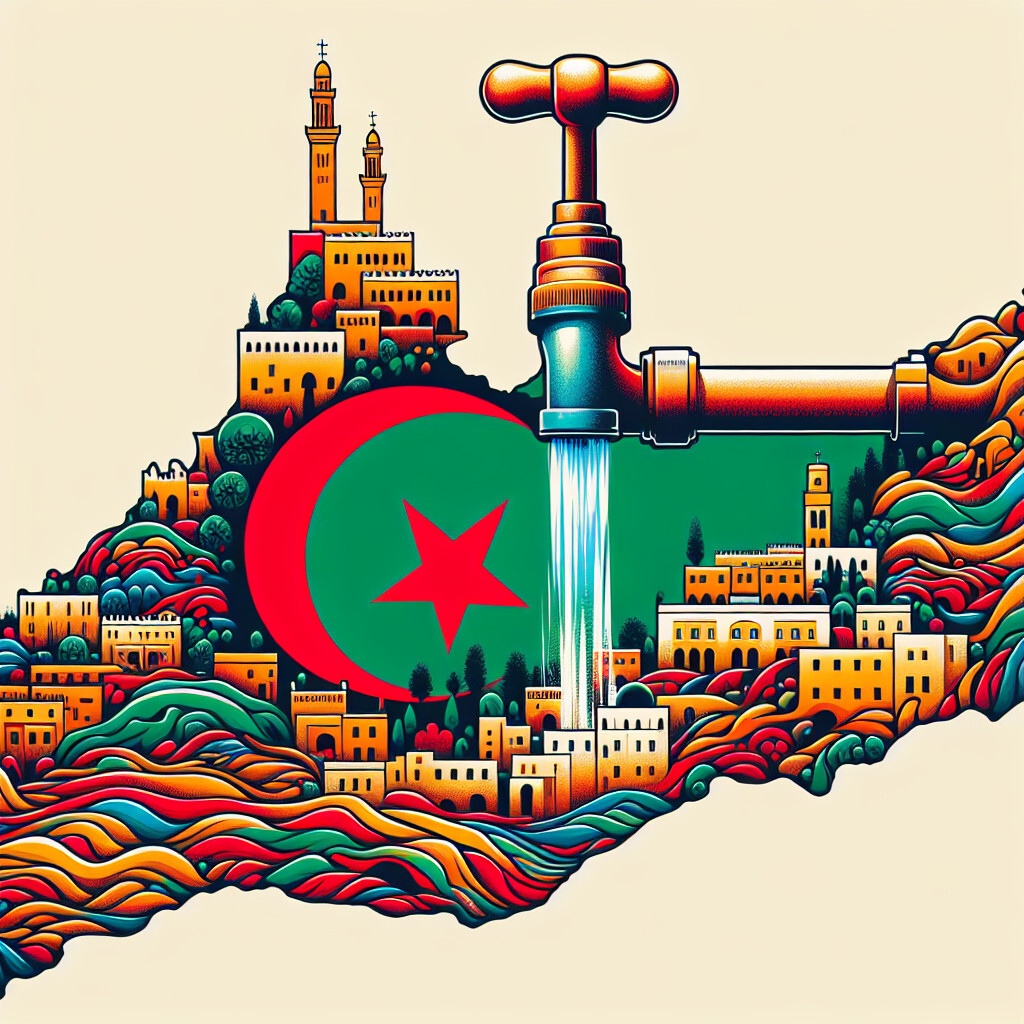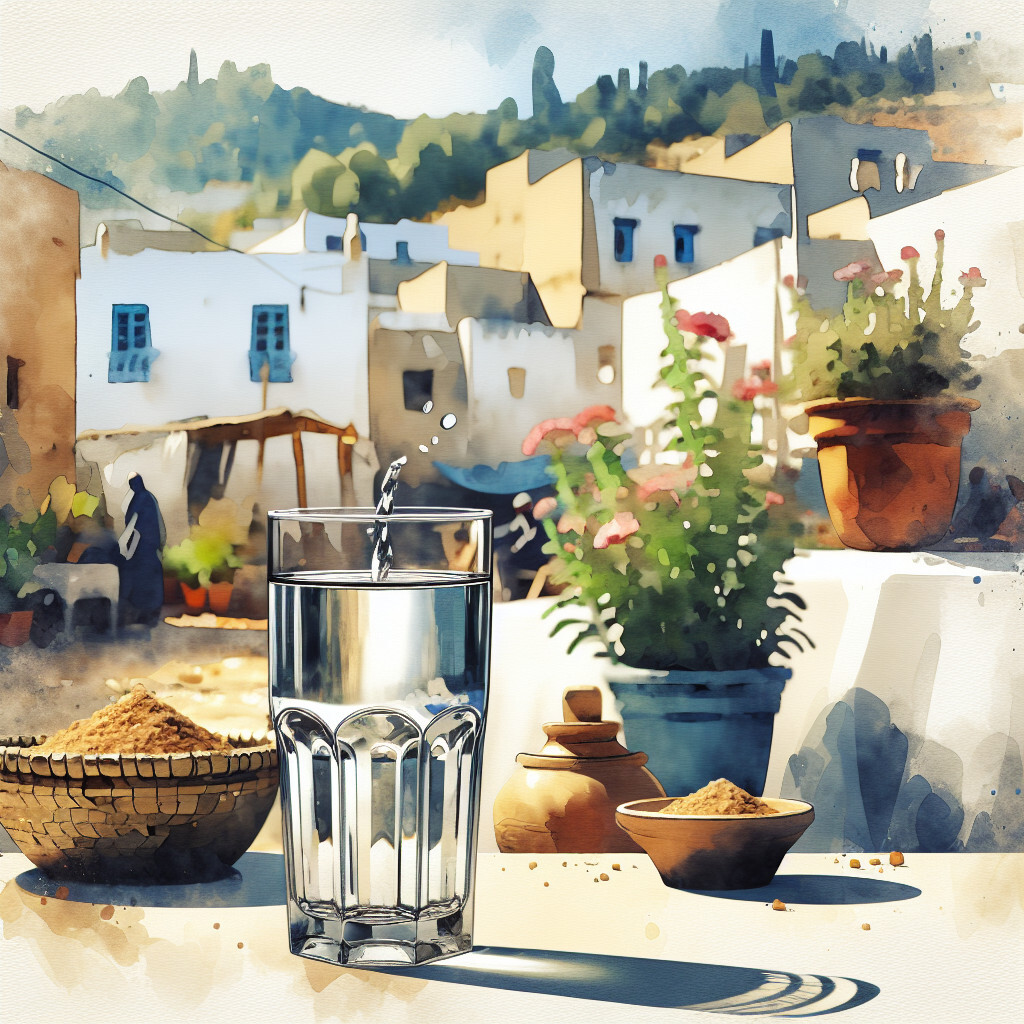-
Table of Contents
“Algeria’s Tap Water: A Blend of Challenges and Potential.”
Introduction

Tap water in Algeria is generally considered safe for consumption in urban areas, as it undergoes treatment processes to remove harmful substances and bacteria. However, the quality can vary depending on the region. In some rural areas, access to clean, potable water can be a challenge due to infrastructural issues and water scarcity. It’s also important to note that despite the water being technically safe to drink, some visitors may experience minor digestive issues due to the change in water composition. Therefore, bottled water is often recommended for tourists.
Understanding the Quality of Tap Water in Algeria
Algeria, the largest country in Africa, is known for its rich history, diverse culture, and stunning landscapes. However, one aspect that often goes unnoticed is the quality of its tap water. Understanding the quality of tap water in Algeria is crucial for both residents and visitors, as it directly impacts health and wellbeing.
Algeria, like many other countries, faces significant challenges in providing clean and safe drinking water to its population. The country’s water supply system is primarily dependent on underground water sources and desalination plants, which are susceptible to contamination and quality issues. The quality of tap water can vary significantly across different regions of the country, with urban areas generally having better access to clean water than rural regions.
In major cities like Algiers, Oran, and Constantine, the tap water is generally safe to drink. The government has invested heavily in water treatment facilities and infrastructure to ensure the water supply meets international standards. Regular testing is conducted to monitor the presence of harmful substances such as bacteria, heavy metals, and chemical pollutants. However, despite these efforts, occasional water quality issues can still occur due to aging infrastructure, inadequate maintenance, and environmental factors.
In contrast, rural areas in Algeria often struggle with access to clean tap water. Many rural communities rely on wells and other local water sources, which are not always adequately treated or monitored for quality. As a result, these areas are more prone to waterborne diseases and other health issues related to poor water quality. The government has been making efforts to improve rural water supply systems, but progress has been slow due to logistical and financial challenges.
Furthermore, the taste of tap water in Algeria can be quite different from what many foreigners are accustomed to. This is primarily due to the high mineral content in the water, which can give it a distinct taste. While this does not necessarily indicate poor quality, some people may prefer to drink bottled water or use a water filter for taste reasons.
Despite the challenges, Algeria has made significant strides in improving its water supply system over the past few decades. The government has implemented various initiatives aimed at expanding access to clean water, upgrading water treatment facilities, and strengthening water quality monitoring systems. These efforts have resulted in notable improvements in the quality of tap water, particularly in urban areas.
However, it’s important to note that while the tap water in many parts of Algeria is safe to drink, visitors are often advised to stick to bottled water. This is mainly due to the potential risk of minor stomach upsets caused by the change in water composition, rather than serious health concerns. It’s also recommended to avoid drinking tap water in areas where the quality is known to be poor or uncertain.
In conclusion, the quality of tap water in Algeria varies across the country, with urban areas generally having better quality water than rural regions. While significant efforts have been made to improve the water supply system, challenges remain, particularly in rural areas. For those visiting Algeria, it’s advisable to drink bottled water to avoid any potential health issues. Despite these challenges, the country continues to work towards ensuring clean and safe drinking water for all its residents.
The Impact of Infrastructure on Algeria’s Tap Water Supply
Algeria, the largest country in Africa, has a complex relationship with its tap water supply. The quality and availability of tap water in Algeria are significantly influenced by the country’s infrastructure, which has been shaped by a combination of historical, geographical, and socio-economic factors.
The country’s water infrastructure has its roots in the colonial era, when the French administration established a network of pipes and reservoirs primarily in the coastal regions. However, this infrastructure was not designed to serve the entire population, and many rural and interior regions were left without access to clean, reliable tap water. After gaining independence in 1962, the Algerian government embarked on a series of ambitious infrastructure projects to extend the water network to these underserved areas.
However, these efforts have been hampered by Algeria’s challenging geography. The country is dominated by the Sahara Desert, which covers more than four-fifths of its territory. This vast, arid region presents significant logistical challenges for the construction and maintenance of water infrastructure. Moreover, the country’s water resources are unevenly distributed, with the majority concentrated in the north, while the south and interior regions are largely arid and desert-like. This geographical imbalance has necessitated the construction of extensive pipelines to transport water from the north to the south, a costly and technically challenging endeavor.
In addition to these geographical challenges, Algeria’s water infrastructure has also been affected by socio-economic factors. The country has experienced rapid urbanization in recent decades, with the urban population growing from 31% in 1960 to over 70% in 2018. This rapid urban growth has put immense pressure on the existing water infrastructure, leading to frequent water shortages in many cities. Moreover, the country’s economic difficulties, exacerbated by the fall in oil prices since 2014, have limited the government’s ability to invest in infrastructure improvements.
Despite these challenges, there have been significant improvements in Algeria’s tap water supply in recent years. The government has launched several major infrastructure projects, including the construction of new dams and desalination plants, to increase the country’s water supply. These efforts have been complemented by initiatives to improve water management and reduce waste, such as the introduction of smart meters and the promotion of water-saving practices.
However, the quality of tap water in Algeria remains a concern. While the water in major cities is generally safe to drink, it can vary in taste and odor due to the presence of minerals and chlorine used in the treatment process. In rural areas, the quality of tap water can be significantly lower, with contamination from agricultural runoff and inadequate sanitation facilities posing serious health risks.
In conclusion, the state of tap water in Algeria is a reflection of the country’s infrastructure, shaped by its historical legacy, geographical challenges, and socio-economic realities. While significant progress has been made in recent years, much work remains to be done to ensure that all Algerians have access to clean, reliable tap water. The country’s future water security will depend on continued investment in infrastructure, improved water management, and the adoption of sustainable practices.
Health Implications of Drinking Tap Water in Algeria
In the North African country of Algeria, the quality of tap water has been a subject of concern for many years. The health implications of drinking tap water in Algeria are significant and multifaceted, warranting a comprehensive examination. This article aims to provide an informative and formal discussion on the matter, shedding light on the potential health risks associated with consuming tap water in Algeria.
Algeria, like many developing countries, faces challenges in providing clean and safe drinking water to its population. The country’s water supply system is often compromised by inadequate infrastructure, poor maintenance, and pollution. These factors contribute to the contamination of tap water, posing serious health risks to the population.
One of the primary health concerns associated with drinking tap water in Algeria is the presence of harmful bacteria and parasites. These microorganisms can cause a range of illnesses, from mild gastrointestinal discomfort to severe diarrheal diseases. In particular, waterborne diseases such as cholera and typhoid fever have been reported in various regions of the country, underscoring the gravity of the situation.
In addition to biological contaminants, the tap water in Algeria is often tainted with chemical pollutants. Industrial waste, agricultural runoff, and improper disposal of household waste contribute to the high levels of chemicals in the water supply. Long-term exposure to these chemicals can lead to chronic health conditions, including kidney damage, liver disease, and various types of cancer.
Furthermore, the high salinity of tap water in certain regions of Algeria is another health concern. Excessive salt intake from drinking water can lead to hypertension, heart disease, and stroke. This issue is particularly prevalent in coastal areas, where seawater intrusion into freshwater sources exacerbates the problem.
The health implications of drinking tap water in Algeria are further compounded by the country’s arid climate and water scarcity issues. The lack of access to clean water forces many Algerians to rely on unsafe sources, increasing their risk of waterborne diseases. This situation is particularly dire in rural areas, where the water infrastructure is often inadequate or non-existent.
In response to these challenges, the Algerian government has implemented various measures to improve the quality of tap water. These include upgrading the water supply infrastructure, enforcing stricter regulations on industrial waste disposal, and promoting water conservation practices. However, these efforts are yet to yield significant results, and the quality of tap water remains a pressing issue.
In conclusion, the health implications of drinking tap water in Algeria are serious and multifaceted. The presence of harmful bacteria, parasites, and chemical pollutants in the water supply poses significant health risks to the population. The high salinity of tap water in certain regions further exacerbates these risks. While efforts are being made to address these issues, the quality of tap water in Algeria remains a matter of concern. Therefore, it is advisable for individuals in Algeria to use water purification methods or consume bottled water to mitigate these health risks.
Solutions to Improve the Tap Water Situation in Algeria
Algeria, the largest country in Africa, has been grappling with a significant challenge concerning its tap water quality. The issue is not only about the availability of water but also its quality, which has been a cause for concern for many Algerians. The tap water situation in Algeria is a complex issue that requires a comprehensive understanding and a multi-faceted approach to address effectively.
The quality of tap water in Algeria varies significantly from one region to another. In some areas, particularly in the northern regions, the tap water is generally safe to drink. However, in the southern and more arid regions, the quality of tap water is often poor due to the high levels of salinity and contamination. The problem is further exacerbated by the country’s arid climate and the overexploitation of water resources, which has led to the depletion of groundwater reserves and the contamination of water sources.
The Algerian government has been making concerted efforts to improve the tap water situation in the country. One of the key strategies has been the construction of desalination plants to treat seawater and make it suitable for human consumption. Algeria is now home to some of the largest desalination plants in the world, which have significantly increased the availability of clean water in the country.
However, while desalination has been a game-changer, it is not a panacea for all the water-related challenges in Algeria. The process is energy-intensive and expensive, making it an unsustainable solution in the long run. Moreover, the desalinated water still needs to be transported to the end-users, which can be a logistical challenge in a country as vast as Algeria.
To complement the desalination efforts, the Algerian government has also been investing in infrastructure to improve the distribution of water. This includes the construction of new pipelines and the upgrading of existing ones to reduce water losses during transportation. The government has also been working on improving the management of water resources to ensure their sustainable use.
Public awareness campaigns have also been launched to educate Algerians about the importance of water conservation. These campaigns aim to change people’s attitudes and behaviors towards water use and encourage them to adopt water-saving practices. This is crucial in a country where water resources are scarce and the demand for water is high.
In addition to these efforts, there is a need for more research and innovation to find sustainable solutions to the tap water situation in Algeria. This could include the development of new technologies for water treatment and desalination, as well as the exploration of alternative water sources such as rainwater harvesting and wastewater recycling.
In conclusion, the tap water situation in Algeria is a complex issue that requires a multi-faceted approach to address. While significant strides have been made in improving the quality and availability of tap water in the country, there is still much work to be done. It will require the concerted efforts of the government, the private sector, and the Algerian people to ensure that everyone has access to safe and clean tap water.
Q&A
1. Question: Is tap water in Algeria safe to drink?
Answer: No, tap water in Algeria is generally not considered safe to drink. It’s recommended to drink bottled or filtered water.
2. Question: What are the common issues with tap water in Algeria?
Answer: The common issues with tap water in Algeria include contamination with bacteria, viruses, and heavy metals due to inadequate water treatment facilities and infrastructure.
3. Question: Are there any efforts to improve the tap water quality in Algeria?
Answer: Yes, the Algerian government has been working on improving water infrastructure and treatment facilities to enhance the quality of tap water. However, progress is slow and challenges remain.
4. Question: How do locals in Algeria usually consume water?
Answer: Locals in Algeria often consume bottled water or use filters to purify tap water before drinking.
Conclusion
The tap water in Algeria is generally considered safe for locals who are used to the water. However, it may not be suitable for all, especially for travelers, due to different water treatment processes and potential bacterial content. It’s recommended to drink bottled water to avoid any potential health issues.






